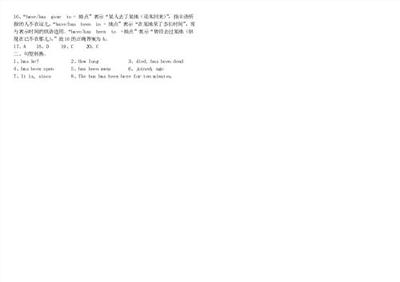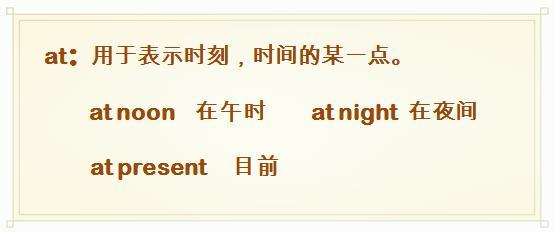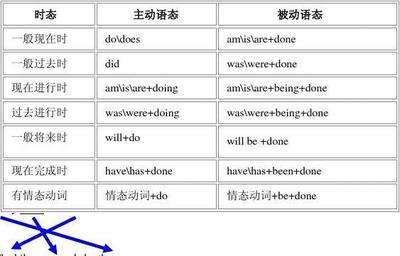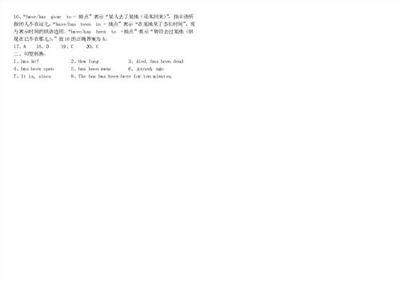时态语态不分家。昨天,小简老师给大家总结了初中英语八种时态的详细用法,今天给大家讲一讲被动语态的基本构成、八种时态的被动语态的构成、被动语态的使用情况以及语态变换中应注意的问题。对于时态还不清楚的同学,可以看一下昨天初中英语微信公众号里的第二篇文章。
be + done
1)一般现在时:am / is / are + done
①People grow rice in the south of the country.
Rice is grown in the south of the country.
②The school doesn't allow us to enter the chemistry lab without a teacher.
We are not allowed to enter the chemistry lab without a teacher.
2)一般过去时:was / were + done
①They agreed on the building of a new car factory last month.
The building of a new car factory was agreed on last month.
②The students didn't forget his lessons easily.
His lessons were not easily forgotten
3)一般将来时:will + be done
①They will send cars abroad by sea.
Cars will be sent abroad by sea.
②They will give plenty of jobs to school-leavers.
Plenty of jobs will be given to school-leavers.
4)一般过去将来时:would + be done
①The manager said they would complete the project by the end of the year.
The manager said the project would be completed by the end of the year.
② The workers told me they would mend the car as soon as possible.
The workers told me that the car would be mended as soon as possible.
5)现在进行时:am / is / are + being + done
①The radio is broadcasting English lessons.
English lessons are being broadcasted on the radio.
② We are painting the rooms.
The rooms are being painted.
6)过去进行时:was / were + being + done
①The workers were mending the road.
The road was being mended.
②This time last year we were planting trees here.
Trees were being planted here this time last year.
7)现在完成时:have / has + been + done
①Someone has told me the sports meeting might be put off.
I have been told the sports meeting might be put off.
②He has brought his book here.
His book has been brought here.
8)过去完成时:had + been + done
①When I got to the theatre, I found they had already sold out the tickets.
When I got to the theatre, I found the tickets had already been sold out.
② The whole country was very sad at the news of his death; people had considered him to be a great leader.
The whole country was very sad at the news of his death; he had been considered to be a great leader
①You must hand in your compositions after class.
Your compositions must be handed in after class.
②He can write a great many letters with the computer.
A great many letters can be written with the computer by him.
1)当不知道或没有必要指出动作的执行者时,这时往往不用by 短语。
“Mr. White, the cup was broken after class. ”
2.突出或强调动作的承受者,如果需要说出动作的执行者,用by 短语。
These records were made by John Denver.
1)把主动语态的宾语变成被动语态的主语。
2)把主动语态的谓语变成被动语态的be + 过去分词,时态要与原句保持一致。
3)把主动语态的主语变为介词by 的宾语,放在被动语态里谓语动词之后,by 短语可以省略。
My aunt invited me to her dinner party.
→I was invited (by my aunt ) to her dinner party.
The school set up a special class to help poor readers.
→A special class to help poor readers was set up in the school.
1) 把主动语态变为被动语态时,其谓语动词的时态要与原句时态保持一致,其谓语动词的数要与新主语保持一致。
We have bought a new computer.
→A new computer has been bought. (正确)
→A new computer have been bought. (错误)
2)含有双宾语的主动句变被动句时,可分别将其中的一个宾语变为主语,另一个不动,一般变间接宾语为主语时比较多。
My uncle gave me a present on my birthday.
→I was given a present on my birthday.
如果把直接宾语(指物)改为主语,则在间接宾语(指人)前加适当的介词,如上句还可以说
→A present was given to me yesterday.
3) 由动词+ 介词或副词构成的短语动词,要把它们作为整体看,即把它们看成一个及物动词,介词或副词不可拆开或漏掉。
The patient is being operated on.
The problem is solved. It needn't be talked about.
His request was turned down.
The sports meet will be put off because of the bad weather
4)带复合宾语(宾语+ 宾补)的动词改为被动语态时,一般把主动结构中的宾语改为主语,而宾语补足语保留在谓语动词后面。
We always keep the classroom clean.
→The classroom is always kept clean.
She told us to follow her instructions.
→We were told to follow her instructions.
注意:在see, watch, hear, notice, listen to, look at, make, feel等动词后作宾语补足语的动词不定式都不带 to,但改成被动语态后必须还原to。
We often hear him play the guitar.
→He is often heard to play the guitar.
5)当主动句的主语是nobody, no one等含有否定意义的不定代词时,被动句中将其变为anybody, 作by的宾语,并将谓语动词变为否定的被动语态。
Nobody can answer this question.
误:The question can be answered by nobody.
正:The question can not be answered by anybody.
6)当否定句中的宾语是anything, anybody, anyone等不定代词时,在被动句中应将其分别变为nothing, nobody, no one作主语,并将谓语动词变为肯定的被动语态。
They haven't done anything to make the river clean.
误:Anything hasn't been done to make the river clean.
正:Nothing has been done to make the river clean.
7)以who为主语开头的疑问句,变被动时,用by whom放在句首。
Who wrote the story?
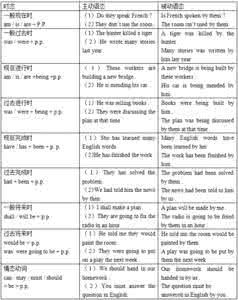
误:Who was the story written?
正:By whom was the story written?
8)有些动词既是及物又是不及物,当它们和well, badly, easily等副词连用时,表示主语内在品质或性能,是不及物动词,用主动表示被动,这时不用被动语态,常见的有:write, read, clean, sell, wash, cook 等。
The cloth washes easily. 这布很好洗。
The new product sells well. 这新产品很畅销。
The books sell well. 这些书销量很好。
9)下列情况主动句不能改为被动句。
①感官系动词一般用主动形式表示被动意义,如:feel,look, seem, taste, sound。
— Do you like the material?
— Yes, it feels very soft.
②不及物动词没有被动语态,如:rise, happen, succeed, remain, lie等。
When we got to the top of the mountain, the sun had already risen.
After the earthquake, few houses remained.
③宾语是反身代词,相互代词,同源宾语,不定式,v-ing形式及抽象名词等,不能变为被动句子的主语。
I taught myself English.
误:Myself was taught English.
We love each other.
误:Each other is loved.
被动语态习题
1 The People's Republic of China __ on October 1, 1949.
A. found
B. was founded
C. is founded
D. was found
2 English ____ in Canada.
A. speaks
B. are spoken
C. is speaking
D. is spoken
3 This English song___ by the girls after class.
A. often sings
B. often sang
C. is often sang
D. is often sung
4 This kind of car ___ in Japan.
A, makes
B. made
C. is making
D. is made
5 New computers ___ all over the world.
A. is used
B. are using
C. are used
D. have used
6.Our room must ___ clean.
A. keep
B. be kept
C. to be kept
D. to keep
7.——I'd like to buy that coat.
——I'm sorry___.
A. it sold
B. it's selling
C. It's been sold
D. it had been sold
8.A new house ___ at the corner of the road.
A. is building
B. is being built
C. been built
D. be building
9.The key ___ on the table when I left.
A. was left
B. will be left
C. is left
D. has been left
10.Doctors ___ in every part of the world.
A. need
B. are needing
C. are needed
D. will need
key:1-5 B D D D C 6-10 B C B A C
 爱华网
爱华网
